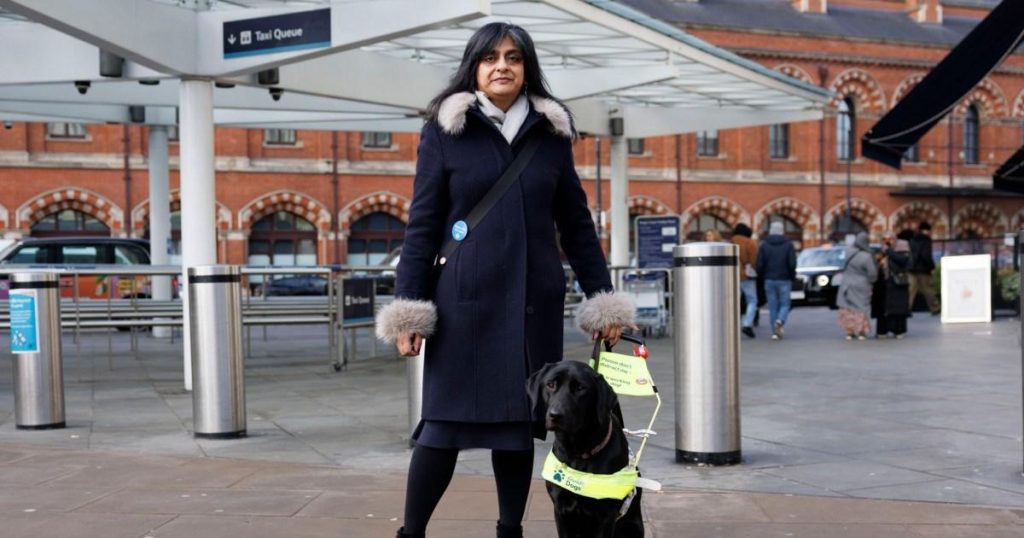Incident and Initial Response:
Deborah Persaud, a disability rights advocate and chair of the campaign group Transport for All, experienced a deeply frustrating incident of discrimination when a pre-booked taxi driver refused to transport her and her guide dog, Betty. Ms. Persaud, who also works as a civil servant, had made the booking with ComCab, owned by Addison Lee, several days in advance, explicitly informing the company of her need for assistance and the presence of her guide dog. Despite these precautions, the driver, Rahim Eren, upon arrival, claimed an allergy to dogs and refused service, speeding away even after Ms. Persaud requested to see his exemption certificate. This left her stranded on the curbside in Dalston, East London, with her luggage, causing her to be an hour late to a friend’s 50th birthday party – an event she had organized.
Impact and Broader Context:
This incident is not an isolated event for Ms. Persaud, who acknowledges that such discriminatory encounters are a recurring challenge for disabled individuals. She emphasized the reliance disabled people place on pre-booked services to ensure accessibility and support, a reliance that was shattered in this instance. Ms. Persaud highlighted the emotional distress and practical inconvenience caused by such refusals, underscoring the impact on disabled individuals’ ability to participate fully in society and the economy. Being denied transportation not only undermines their ability to work and meet social commitments but also creates additional expenses and stress in finding alternative travel arrangements. Furthermore, it reinforces the sense of exclusion and marginalization that disabled people often face.
Systemic Discrimination and Advocacy Efforts:
Ms. Persaud’s experience resonates with countless other disabled individuals who face similar barriers. She cited the case of BBC journalist Sean Dilley, who has been refused entry to establishments due to his guide dog, illustrating the pervasiveness of this discrimination. This ongoing struggle for accessibility limits disabled people’s participation in everyday activities, hindering their ability to contribute to the economy and enjoy social engagements like dining out, attending movies, or meeting friends. Ms. Persaud underscored the exhaustion and frustration of constantly having to fight for equal access, questioning why her time and needs are seemingly valued less than others. Her advocacy work with Transport for All focuses on ensuring accessible and dignified transportation for all, enabling disabled individuals to travel independently and on their own terms.
Legal Action and Company Response:
Following the incident, Ms. Persaud lodged a complaint with both ComCab and Transport for London (TfL). TfL subsequently pursued legal action against the driver, highlighting the prevalence of such discriminatory acts and the regulatory body’s commitment to upholding the law. The driver, Rahim Eren, pleaded guilty to violating the Equality Act by refusing to transport a passenger with an assistance dog. While Ms. Persaud appreciated TfL’s efforts, she emphasized that this prosecution represents only a small fraction of the discrimination faced by disabled people and that much more work remains to be done.
Addison Lee’s Statement and TfL’s Reaction:
Addison Lee, the parent company of ComCab, issued a statement acknowledging their commitment to providing accessible services for disabled individuals. They attributed the incident to a system error where the driver did not see the specific booking requirements before accepting the job. They expressed disappointment in the driver’s conduct and apologized to Ms. Persaud for the inconvenience caused. TfL also released a statement emphasizing the right of all individuals to travel without facing discrimination and thanked Ms. Persaud for reporting the incident. They reiterated their commitment to ensuring a fair and accessible transport system for everyone.
Conclusion:
Deborah Persaud’s experience highlights the persistent challenges faced by disabled individuals seeking accessible transportation. Her story underscores the importance of continued advocacy, robust enforcement of existing laws, and greater awareness within the transportation industry to ensure that disabled people are treated with dignity and respect, and afforded the same opportunities as everyone else. The incident also serves as a reminder of the emotional toll that such discrimination takes on individuals and the collective responsibility to create a truly inclusive society. While legal action was taken against the driver, the broader issue of accessibility and equal treatment remains a pressing concern.


